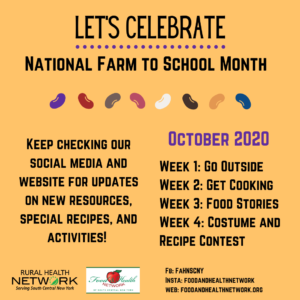Our third week of celebrating National Farm to School Month is here! Check out our new resources with our week 3 theme: Food Stories! Food Stories was chosen as a theme to highlight and uplift underrepresented and oppressed voices and foodways in our food system. This theme will include multiple posts exploring different social identity groups, including Indigenous First Nations, Black people, fat people, and women and gender non-confirming people.
We ask that all our readers keep an open mind when grappling with “new” or previously unexplored concepts such as the ones we chose to include in this series. We believe it is important to get in the habit of distinguishing between your personal “truth” and universal “Truth,” especially as you expand your understanding of power and systems of oppression. Continue researching and having conversations with people in your community and make space for deep reflection. Five minutes of purposeful thinking, journaling, or a conversation can go a long way!

Our first list of resources in the week 3 theme Food Stories: Indigenous First Nations
“Native American cuisine is America’s original food, dating back some 10,000 years. So why don’t we see Native restaurants on every street corner in the U.S.? In this James Beard-nominated episode, Yara goes on a road trip through the American Southwest to find out.” (video below) Yara Elmjouie ends this video with a call to action! What ingredients do you see in your own cuisine that originated as Native foodways?
Explore the resource “Decolonize Your Diet: Notes Towards Decolonization,” written by Catrióna Rueda Esquibel, published in FoodFirst. This article is one of a multi-authored series on racism and liberation in the food system. What are some of the dominant cultural foods we often see and have access to in North America, in restaurants, school meals, grocery stores, etc.? Can you name the cultures where these ingredients and food preparation comes from? When and where do you see your own culture reflected in these dominant foodways?
Read this Civil Eats article “Neftalí Durán is Using Indigenous Wisdom to Educate Eaters and Address Inequity” for a discussion on tackling inequity for Native and Indigenous people in the past and present. How does the COVID-19 pandemic affect Indigenous communities, and what are some of the resistance tactics for building food sovereignty?
North American Traditional Indigenous Food Systems (NāTIFS) is another great organization working to address the economic and health crises affecting Native communities by re-establishing Native foodways.
Are you interested in more Farm to School content in your virtual learning? Reach out to our team via this sign up link.
Stay tuned for the final week of National Farm to School Month content on our blog and social media!
Do you have any ideas for content you’d like to see? Contact us!
